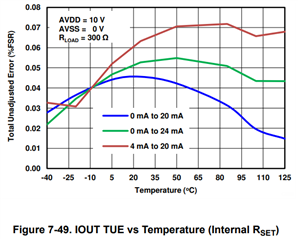Hi support team.
I have two questions regarding TUE (total unajusted error).
1. Is the formula for calculating TUE as follows? Also, are the calculations given in the example correct?
TUE=sqrt(GE^2+OE^2+INL^2)
GE:gain error
OE:offset error
Example: When using at 4mA-20mA
FSR=16mA -> (4mA+16mA/2^n)
1LSB=16mA/2^16=0.244uA
Case 1 Internal Rset @Ta=25℃
GE_max=0.08*16mA/100=12.8uA
OE_max=0.07*16mA/100=11.2uA
INL_max=0.024*16mA/100=3.84uA
TUE=sqrt(12.8uA^2+11.2uA^2+3.84uA^2)=17.44uA=0.11%FSR
2. The specification in the data sheet is 0.08%FSR for Case 1, which is the most fluctuating case, so it is smaller than the calculated value.
I can't understand what this is.
Does this mean that an error of 17.44uA will occur in the worst case regardless of the code?
Best regads,
Higa


